From quantum computing to blockchain: frontiers, trends, and challenges
On November 30, 2019, the "Quantum Information and Blockchain Technology" Guangzhou Forum was successfully held at South China University of Technology. This forum was initiated by Professor Zhu Jiaming, the director of the Academic and Technical Committee of the Digital Asset Research Institute. The Digital Asset Research Institute and the South China University of Technology's School of Automation Science and Engineering jointly hosted the event. Professor South China University of Technology Cui Wei acted as the convener of the meeting.
This forum has conducted special discussions in many fields of quantum science research, including: direct communication and algorithms for quantum security, the status of quantum hegemony, the research foundation and frontiers of superconducting quantum computing, quantum generation countermeasure networks, quantum chemical simulation, and quantum computing clouds Platform, Frontiers of Hybrid Quantum Computing and Quantum Information Networks, Research on Practical Quantum Confidentiality Query Protocols, Collision between Quantum Thinking and Blockchain Thinking, Quantum Computing and Blockchain Technology, Blockchain Technology and Application Practice, Areas under the Shadow of Quantum Computing Blockchain, atomic exchange research based on zero-knowledge proof, blockchain privacy protection, etc.
Quantum Computing and Blockchain
Zhu Jiaming
- Featured on Twitter | Unlocking 1 billion XRP? You misunderstand Ripple too much
- AI chip giant NVIDIA launches blockchain + AI computing platform, 3D model analysis time reduced from hours to minutes
- New Credit Card SBC Wallet Cards Built-in Cryptocurrency Hot and Cold Wallets, SoftBank Card 3.0 Goes Live
Dean of Digital Asset Research Institute
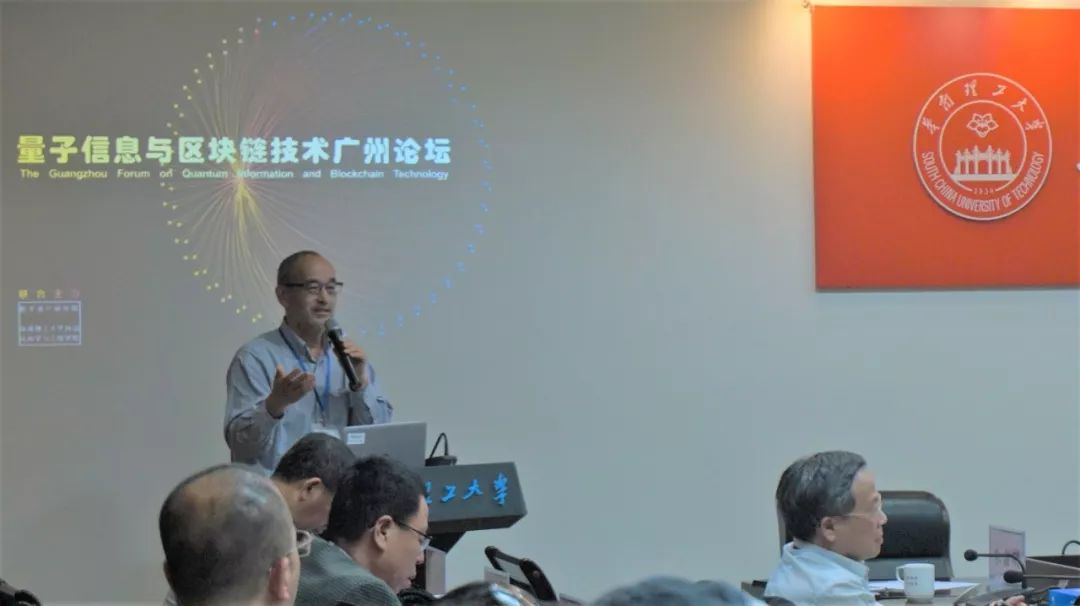
Zhu Jiaming delivered an opening speech entitled "Quantum Computing and Blockchain." He pointed out that we are living in an era where science and technology dominate economic development and social transformation. The continuous growth of scientific clusters and technological hybrids has led to the approach of "technical singularities", and the driving force behind them is likely to come from "quantum computing". In particular, the "quantum hegemony" announced by Google in 2019 will have an inestimable impact on the 2020s. He pointed out that the source of all of these can be traced back to the three conferences of the 20th century, namely the Second International Congress of Mathematicians, held in Paris in 1900, the 5th Solvay Conference in Brussels in 1927, and Macy's conference in New York. He also pointed out that "What really has a lasting and profound impact on human history in the 20th century is the formation of a complex and systematic scientific system. The expansion and development of industrialization over the past 100 years has provided unprecedented huge scenes for the application and innovation of science and technology. . Nowadays, science and technology itself is becoming a scene. All traditional industries, including our own human beings, are included. If the Renaissance era from the 13th to 16th centuries is the birth of modern natural science driven by humanities and arts, and then triggered by The era of the industrial revolution dominated by industrialists, entrepreneurs, and bankers; then, since the 20th century, it was the scientific and technological revolution that led change and the humanistic spirit and concepts. It was the group of mathematicians, physicists, and biologists who created information and The era of the digital economy. We are at the intersection of these two eras. "Finally, he concluded with three sentences from three scientists:" We must know, we must know (Hilbert); if no one Shocked by quantum theory, he didn't understand it at all (Bohr); science is not difficult (Von Noy ) "
"Quantum Safe Direct Communications and Algorithms"
Long Guilu
Tsinghua University, National Jieqing
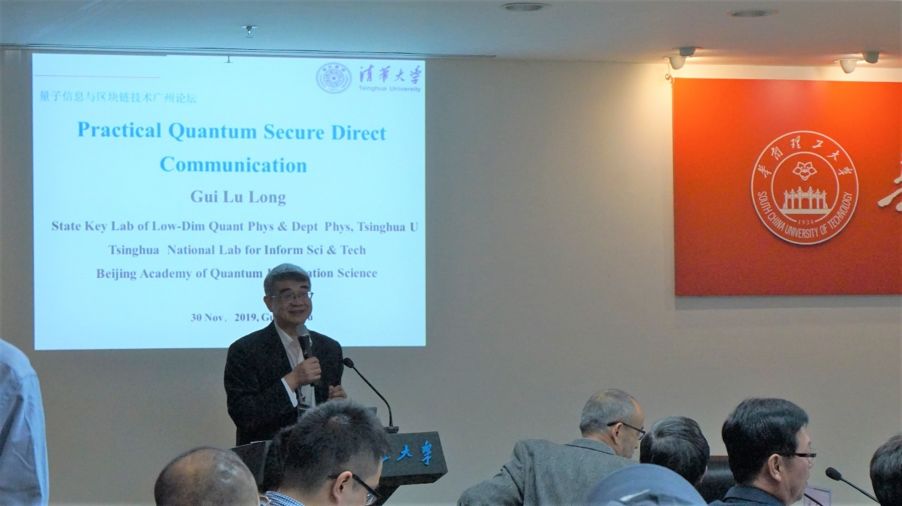
Long Guilu delivered a keynote speech entitled "Quantum Secure Direct Communications and Algorithms." Today 19 years ago, Long Guilu put forward the theory of quantum direct communication, which is one of the three main types of quantum secure communication theory in the world. The traditional confidential communication block diagram is divided into key distribution channels and ciphertext communication channels. Quantum secure direct communication does not require a secret key, which changes the block diagram of confidential communication. Long Guilu interpreted the theory in detail and introduced the world's first useful prototype developed by his team, proving that quantum direct communication can improve the overall security and value of quantum communication. At the same time, Long Guilu introduced the quantum precise search algorithm and dual quantum calculation method based on personal research results, including how to complete accurate quantum search based on phase matching, how the Dragon algorithm realized Grover, which is one of the two most important algorithms in quantum algorithms. The algorithm works best, how dual quantum computing is applied to the preparation of programmable quantum chips, and the unitary operator linear combination method, which is one of the five important methods of constructing quantum algorithms in the world. Finally, Long Guilu introduced NMR quantum computing experiments.
"Second Quantum Technology Revolution-Quantum Hegemony Has Arrived? 》
Zhang Qingrui
Distinguished Professor of Taiwan University, IEEE Fellow, Academician of Russian Academy of Engineering
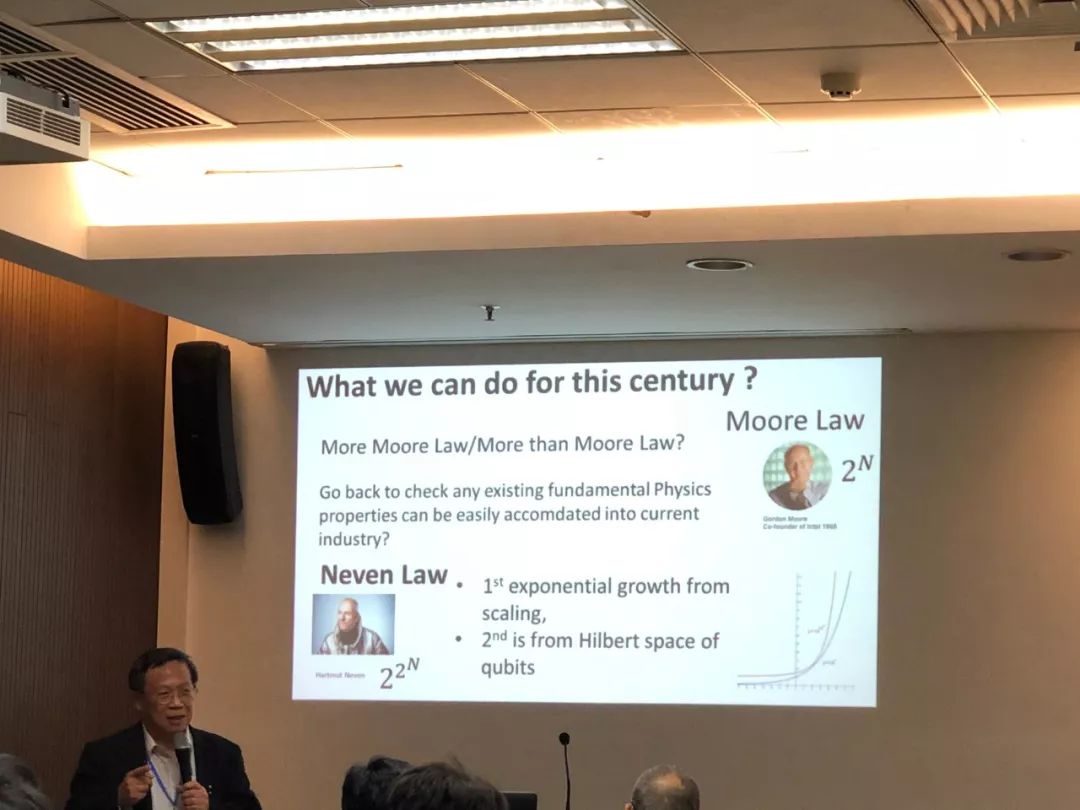
Zhang Qingrui published the title "Second Quantum Technology Revolution-Has Quantum Hegemony Arrived?" ”Keynote Speech. He pointed out that at the end of the 19th century, people observed the quantum world and proposed the theory of quantum mechanics, which subverted the classical physical world. The first quantum revolution caused electronics and classic computers to flourish to this day. Although supercomputers are getting faster, there are still bottlenecks. The size of transistors complying with Moore's Law has reached its limit; parallelization calculations are also reaching saturation; the most important thing is that supercomputers are increasingly energy-consuming and costly. The second quantum revolution will thus begin, and quantum computers will be the antidote to the current bottleneck. The unit of a quantum computer is a qubit, which mainly uses two characteristics: the superposition state and the entangled state. According to these two characteristics, a classical bit 0 and 1 can only describe the north and south poles of the Bloch ball, but the qubit describes not only two points, but the Bloch sphere at one time. All points. The four qubits do not refer to the four Bloch spheres, but the 2 ^ 4 parallel space provided by the four Bloch spheres, which expresses all the possibilities of the fourth power of 2. So a quantum computer can do 2 ^ 4 parallel processes at the same time. However, the quantum algorithm must be performed in a black box of a quantum computer. The intermediate process must allow it to develop automatically. You cannot peek. Once you peek (called measurement in the quantum world), you will return to the classical world. The quantum process inside this black box is called Oracle. Finally, he emphasized again that the future belongs to quantum, and not only computers, sensors, communicators, etc. will be quantized.
"Research Foundation and Frontiers of Superconducting Quantum Computing"
Professor Liu Yuxi
Tsinghua University, National Jieqing
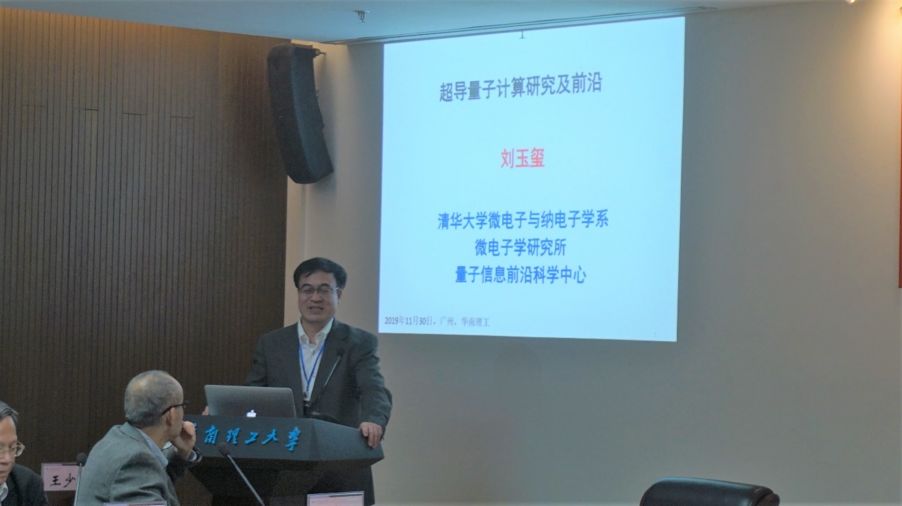
Liu Yuxi gave a speech entitled "Research Foundation and Frontiers of Superconducting Quantum Computing". He systematically introduced why quantum computing is needed, what it is, and the main components of superconducting quantum computing. In combination with the history of superconducting quantum computing, Liu Yuxi introduced his main work and the main progress at this stage. Finally, Liu Yuxi put forward some views on the key issues and developments that need to be solved in the future of quantum computing.
Quantum Generated Adversarial Network
Professor Li Luzhou
Sun Yat-sen University
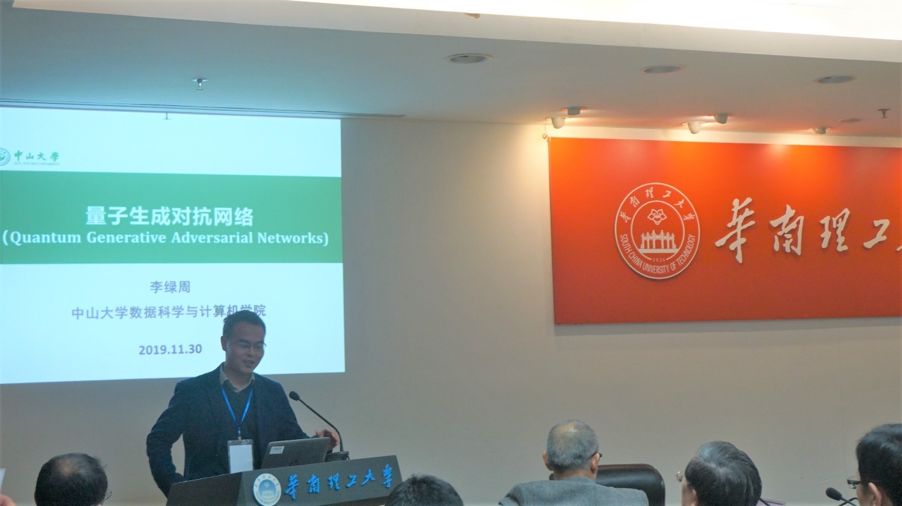
Li Luzhou gave a speech entitled "Quantum Generation Adversarial Network". He pointed out that exploring quantum advantages is one of the core problems of quantum computing research. What are the advantages of quantum computers over classic computers? What are the advantages? These issues require in-depth study. The advantages of quantum computing can be studied qualitatively and quantitatively from the aspects of time complexity, query complexity, communication complexity, and circuit depth complexity. These studies cannot be separated from quantum algorithm design. In a sense, it can be said that quantum algorithms are the soul of quantum computing. Only when the research of physical implementation and the research of software including quantum algorithms have developed in parallel can quantum computing become a flesh and blood whole. Then, he introduced the concise process of quantum algorithms, and pointed out that they have entered the quantum algorithms oriented to big data environment. Furthermore, he explained the cross-research on quantum computing and machine learning in recent years, and how quantum machine learning embodies quantum advantages. Finally, he introduced his personal work on a quantum production adversarial network model based on variable component subcircuits.
"Introduction to Quantum Chemistry Simulation and Huawei Quantum Computing Cloud Platform HiQ"
Dr Xing Yao
Huawei Senior Researcher
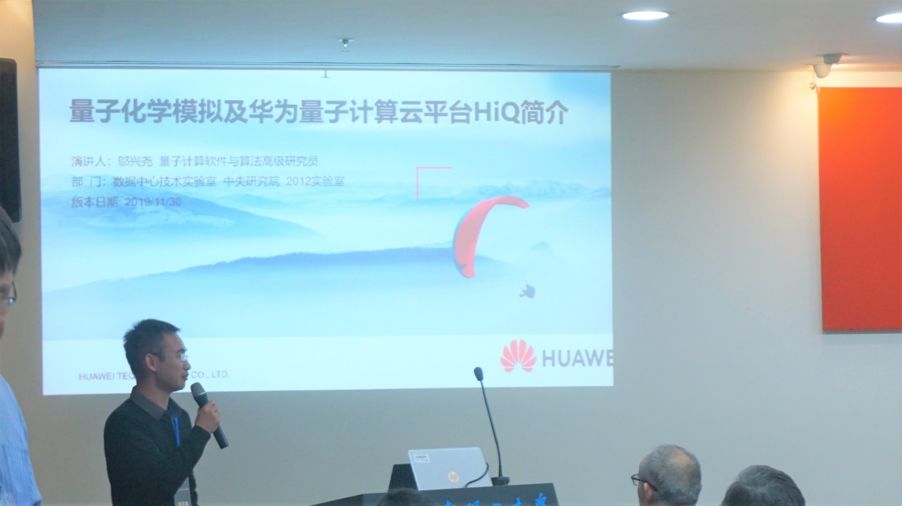
Wu Xingyao gave a keynote speech entitled "Introduction to Quantum Chemical Simulation and Introduction to Huawei's Quantum Computing Cloud Platform HiQ" at the meeting. He pointed out that noisy medium-scale quantum devices (NISQ) are a hot topic of recent research, mainly considering quantum devices with 50-100 physical qubits. Among them, how to use NISQ equipment to achieve quantum advantages is a major focus in this field. The application of NISQ equipment includes a variety of issues such as random sampling, combinatorial optimization, and quantum simulation. In the speech, he mainly introduced the application of NISQ equipment in quantum chemical simulation, and optimized the molecular ground state energy through the quantum classical hybrid algorithm (Variational Quantum Eigensolver), and demonstrated the industry's largest scale on the Huawei HiQ quantum cloud platform. Molecular simulation (14 molecular space orbits). In the second half of the speech, we also introduced the upgrade features of Huawei HiQ 2.0, including the HiQ Fermion module supporting quantum chemical simulation, the HiQ Pulse module supporting online quantum control design, and the upgrade of the HiQ simulator and programming framework.
Frontiers of Hybrid Quantum Computing and Quantum Information Networks
Professor Xiangze Liang
Sun Yat-sen University, 1,000 young people
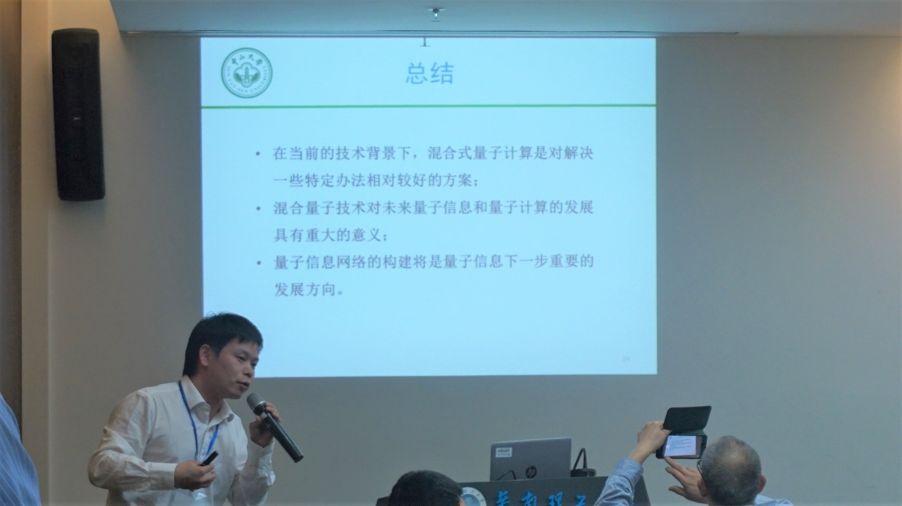
Xiang Zeliang delivered a keynote speech entitled "Front End of Hybrid Quantum Computing and Quantum Information Networks". He introduced several research directions related to hybrid systems that have extensive research and application prospects at the current stage where quantum computing is not yet fully mature and general quantum computers have not made breakthrough progress. He first introduced hybrid quantum computing that combines a preliminary dedicated quantum computer with a classical computer, and pointed out that it has strong feasibility and good application value at this stage. Similarly, there are many backup physical systems for quantum computing, but each has its own advantages and disadvantages. Therefore, integrating all directors, constructing new hybrid quantum systems, and deriving new quantum technologies have also become the direction that quantum computing needs to develop next. Furthermore, the efficient connection of quantum computing nodes based on hybrid systems to build a quantum information network is also an essential foundation for large-scale quantum information transfer and collaborative computing in the future.
《Research Progress on Practical Quantum Confidentiality Query Protocols》
Professor Gao Fei
Young Yangtze River Scholar, Ministry of Education, Beijing University of Posts and Telecommunications
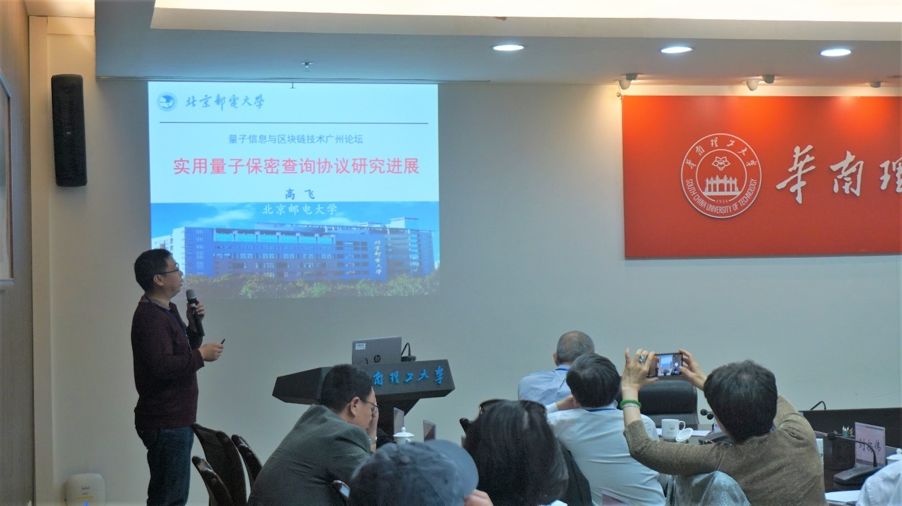
Gao Fei delivered a keynote speech entitled "Research Progress in Practical Quantum Confidentiality Query Protocols". He pointed out that many kinds of quantum cryptographic protocols have been proposed, but due to the limitations of current quantum control technology, there are still few practical protocols. The quantum secret inquiry can be regarded as the N pass 1 inadvertent transmission with appropriate relaxation of security requirements. This type of protocol can be implemented as long as it uses a technology similar to quantum key distribution. It has strong practical potential and has attracted widespread attention once it was proposed. Finally, Gao Fei briefly introduced the research background and development status of quantum cryptography, some theoretical problems faced by quantum confidential query protocols in the process of practical application, and corresponding research progress.
“ The Dialogue Between Cats and Demons: The Collision Between Quantum Thinking and Blockchain Thinking ''
Dr. Jun Zou
CEO of Express Chain Service Co., Ltd.
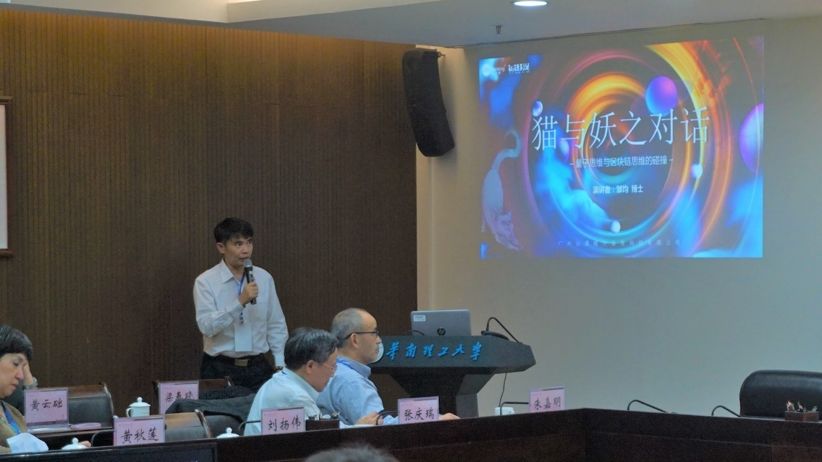
Zou Jun delivered a keynote speech entitled "The Dialogue between Cats and Demons: The Collision between Quantum Thinking and Blockchain Thinking". He analyzed the characteristics of quantum computing and blockchain from a philosophical level. He compared quantum computing to "Schrodinger's cat" and blockchain to "Maxwell demon." After that, the definition of quantum qubit, the realization and simulation of quantum gate, and the measured results on IBM quantum cloud are explained in detail. He also introduced the principles of quantum computing from the theoretical to practical level, as well as two commonly used quantum computing algorithms and their characteristics, Shor and Grover. Finally, he discussed the quantum encryption algorithm and proposed four possible improvements that quantum computing can bring to the blockchain: quantum randomness makes the blockchain say goodbye to pseudo-random numbers, quantum entanglement helps key distribution, and unknown quantum states are impossible Clonality, quantum teleportation.
Quantum Computing and Blockchain
Dr. Zhifeng Li
Head of Quantum Cat Science Museum
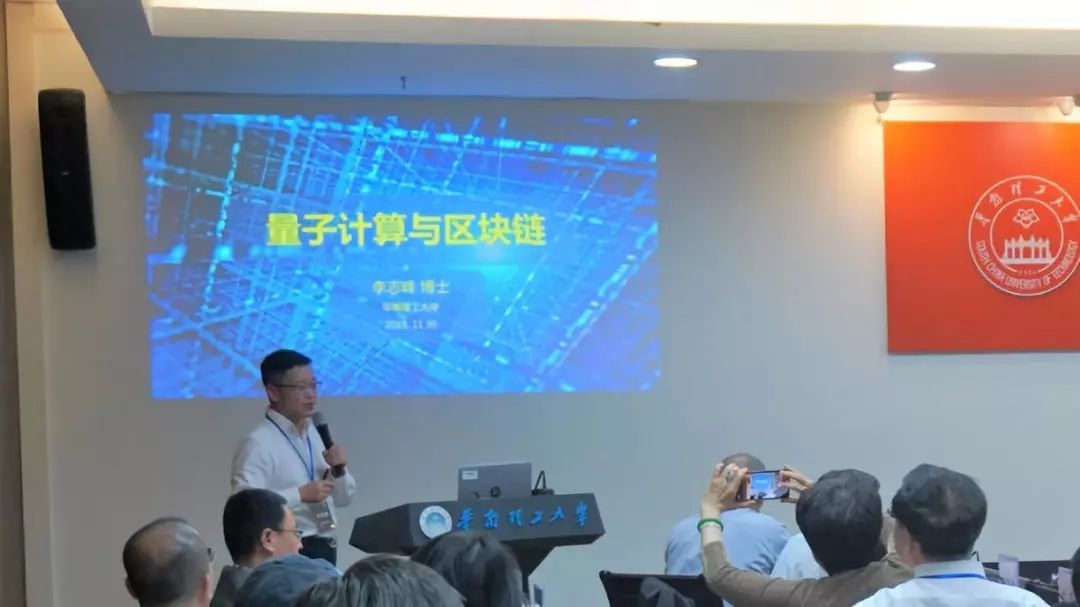
Li Zhifeng delivered a speech entitled "Quantum Computing and Blockchain." He introduced the basics of quantum computing, the power of quantum computers, the technical direction of quantum computers and the latest developments. It also conducted census reports on the related policies issued by various countries and the research situation of universities around the world. In addition, based on the technical characteristics of the blockchain, cryptographic security, and information security, he analyzed the threats that quantum computing poses to traditional encryption algorithms, and proposed cryptographic protection measures for the blockchain in the quantum computing era. Finally, he introduced the research progress of quantum blockchain and how to finally realize a secure blockchain in the quantum computing environment.
"Blockchain Technology and Application Practice"
Professor Yu Xiangyang
Sun Yat-sen University, Chief Scientist, Guangzhou Zhilian Technology Co., Ltd.
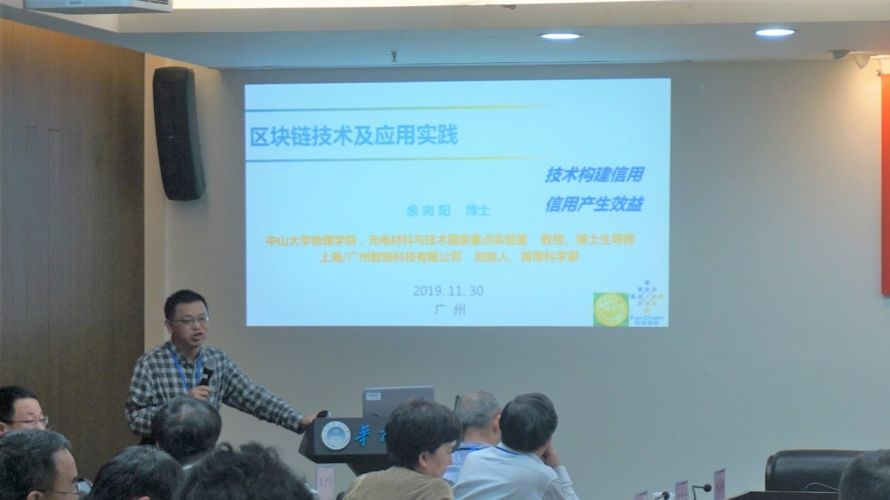
Yu Xiangyang delivered a keynote speech entitled "Blockchain Technology and Application Practice". He proposed that the current data characteristics are realizing the characteristics of multi-dimensional collection and continuous integration. It is necessary to use the characteristics of the blockchain to establish an intelligent mutual certification data processing system to complete the data logic under the blockchain thinking mode. After that, he introduced the current technical foundation, technical characteristics and application modes of the blockchain, as well as cases of blockchain technology solutions, including blockchain browsers, trusted smart IoT platforms, data tampering monitoring platforms, and Baas platforms. Architecture and implementation. Finally, Yu Xiangyang carefully explained the mode and technological innovation of the integration of blockchain and the Internet of Things, especially how to achieve the integration with blockchain technology without changing the existing IoT architecture and characteristics. He used the blockchain miniature intelligent spectrometer as a case for specific analysis and explanation.
Blockchain in the Shadow of Quantum Computing
Dr Guo Yu
Founder of Abbey Labs
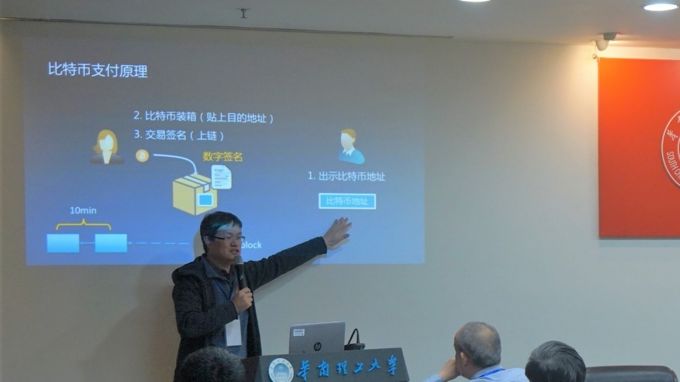
Guo Yu delivered a keynote speech entitled "Blockchain under the Shadow of Quantum Computing". The core analysis was whether the blockchain technology could still guarantee security under the gradual realization of quantum hegemony. He proposed and discussed several quantum attack scenarios, models, and feasibility calculations for blockchain security issues. The first is the quantum attack mode for "POW mining." In the setting of actual conditions, he compared the speed of quantum calculation SHA256 combined with Grover's algorithm and the speed of classic ASIC miner to calculate SHA256. At the same time, he discussed three types of fork long-range attack, fake block attack, and birthday algorithm attack. The impact of quantum computing on "POW mining" under attack. In conclusion, Bitcoin's PoW consensus is limited by quantum computing. Secondly, it is aimed at "the security hypothesis of quantum attack on digital signatures: the elliptic curve discrete logarithm problem (ECDLP)". He proposed that combining quantum calculation with the shor algorithm makes it easier to crack the private key from the public key, which is difficult for classical calculations. Combining birthday calculations with quantum computing makes it easier to crack public keys from addresses, but it is more difficult for classical computing. It can be said that Satoshi Nakamoto's design using Bitcoin addresses has a prescient resistance to quantum computing. However, in the Bitcoin payment model, the early public keys were exposed on the blockchain, and about one-third of Bitcoins have been exposed, including Satoshi Nakamoto's legacy. He then analyzed the timing of quantum computers' ability to launch a lethal Bitcoin attack. Under the most optimistic forecast, the quantum attack time will be shortened to 30 minutes by 2027. Except for Bitcoin, Ethereum and Libra are both in a highly dangerous state of quantum attack. Finally, he looked forward to the development of blockchain technology in the post-quantum era, including complex PoW algorithms in memory, BFT-like consensus protocols, and lattice cryptography.
Research on Atomic Exchange Based on Zero-Knowledge Proof
Associate Professor Cao Ling
Chongqing University of Posts and Telecommunications
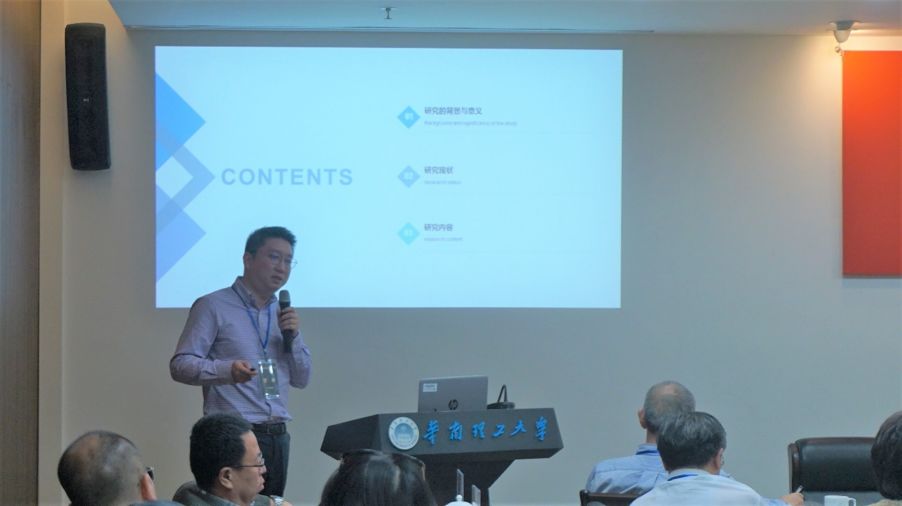
Cao Ling delivered a keynote speech entitled "Research on Atomic Exchange Based on Zero-Knowledge Proof." He explained the current research situation in this area from three aspects: research background and significance, research status and research content. He pointed out that electronic cash attempts based on the basic cryptographic principles of Bitcoin had already appeared before the advent of Bitcoin. The essence of Bitcoin is the trust manufacturing machine, and its connotation includes shared ledgers, smart contracts, privacy protection, and consensus mechanisms. Finally, he focused on the atomic exchange of one of the four blockchain cross-chain technologies, and how to use zero-knowledge proof in the process of atomic exchange, and realize anonymous transactions to protect the privacy of both parties in the transaction.
"Blockchain Privacy Protection"
Professor Wan Zhiguo
Shan Dong University
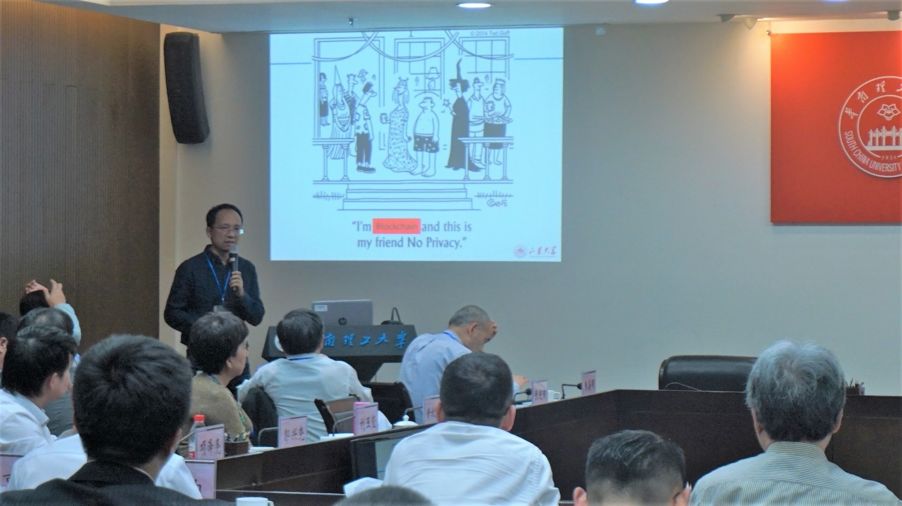
Wan Zhiguo delivered a keynote speech entitled "Blockchain Privacy Protection". He first explained what privacy and privacy are, and the real dilemmas faced by privacy protection. After that, the privacy protection based on the blockchain is classified into small hidden, medium hidden and large hidden. He pointed out that zero-knowledge proof is a truly big hidden blockchain privacy protection technology, and its application examples have developed from account models to thresholds, connected cars, data sharing, and supply chain finance. Finally, he focused on zero-knowledge proofs and analyzed the functions, verifiable calculations, and efficiency of zero-knowledge proofs. In addition, he introduced the example of Zk-SNARK and the application case of zero-knowledge proof, emphasizing that the blockchain in 2019 is equivalent to the Internet in 2000, and zero-knowledge proof will become the focus of research.
"to sum up"
Zhu Jiaming
Dean of Digital Asset Research Institute
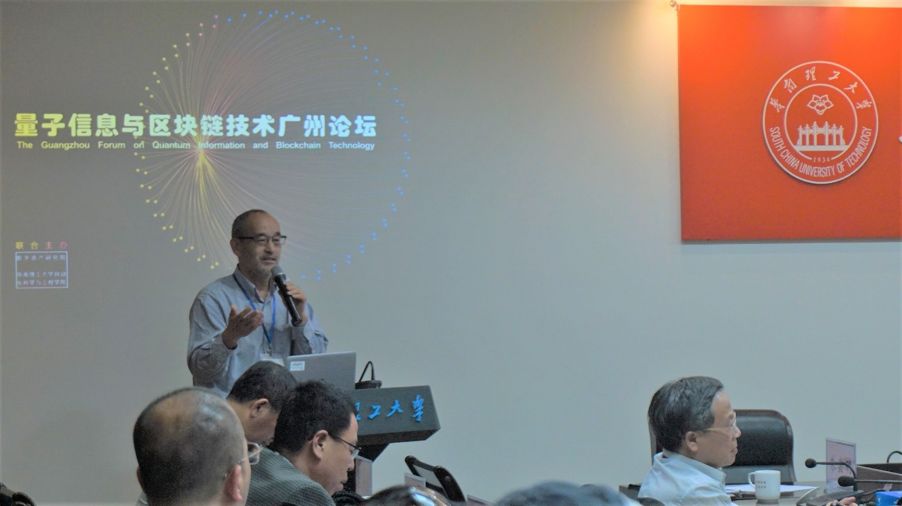
Zhu Jiaming delivered a concluding speech. He pointed out that behind today's discussion of quantum science and technology is actually the famous issue of the Einstein-Boll argument of 1927: the question of whether God rolls the dice. Let's imagine a scenario: if Einstein, Ball and Planck live to this day, which of them will participate in today's seminar, which ones are they completely expected and which ones are unexpected? In terms of how to view the laws and determinism of the universe, and whether "God rolls the dice", is it still divided into two "camps"?
Zhu Jiaming said: If such a scenario does happen, they will probably "seek common ground while shelving differences" and form a certain consensus on the following issues: (1) the principles and framework of quantum mechanics laid in the 1920s are not outdated; (2) ) Quantum mechanics has promoted the emergence and development of interdisciplinary subjects such as quantum chemistry and quantum biology; (3) After one hundred years, human beings finally approached, and even entered the "quantum era". The digital economy era is nothing but the quantum economy era. A relatively basic form; (4) An important mark of the quantum era is a comprehensive breakthrough from quantum science and technology to applications, and an R & D chain has been formed; (5) The interaction between industrialization and commercialization of quantum science and technology has begun: (6) The world is quietly entering the era of quantum competition. Major economies in the world have begun to design a "quantum age" strategy and inject national interests and geopolitical factors into the "quantum age" strategy: (7) Google's definition of "quantum hegemony" It has begun the increasingly fierce battle for quantum hegemony; (8) "General education" in quantum science Imminent.
The relationship between quantum computing and "blockchain" is a subject worthy of further discussion. If it is acknowledged that "blockchain" is firstly science and secondly technology, then there is likely to be some kind of gene and chromosome connection between quantum computing and blockchain? There is no way to discuss this issue in detail today, but one thing is certain: the concept of "quantum blockchain" is likely to be established, and even the main direction worth exploring. Zhu Jiaming said that he tends to take the position that the development of quantum technology and quantum science is not destroying or shaking the entire structure and system of the "blockchain", but it may provide new "blockchain" to a large extent. Technology element, transform it into a new technology system based on quantum science.
In the end, Zhu Jiaming pointed out that at least the past half century, especially in the past one or two decades, all major scientific and technological ideas and technologies, computers, chip-based Moore's Law, the Internet, big data, cloud computing The emergence of smart phones, artificial intelligence, virtual worlds, and blockchains are all arranged by a mysterious force. New things are launched almost every time. They are very regular, very rhythmic, similar to the "macro puzzle." ". Can it be said that, to this day, everything that should come out has come out, everything that should come out has come on, and everything that should be revealed has been revealed. If so, we need to think globally about the scientific structure we are in, including the theme of today's meeting. Of course, it is still difficult for us to truly understand, even feel and realize the deepest changes in our world, especially the approaching "paradigm" change from thought to science, and the connotation of institutional transformation of economy and society. Therefore, we need to face the future with a very humble and solemn spirit and attitude.
We will continue to update Blocking; if you have any questions or suggestions, please contact us!
Was this article helpful?
93 out of 132 found this helpful
Related articles
- Growth of network scale creates the illusion of sustainability, Lightning Network is "irrational" and has privacy issues
- Lightning Network receives support from Bitfinex exchange, stablecoin will be ushered in next step
- Tracking the top 10 currencies from market sentiment
- Figure Technologies Raises $ 58 Million, Morgan Creek, DCG Participated
- The market is stuck, the market still needs time to sort out
- Zero-based entry DeFi: teach you how to increase Ethereum transaction fees
- European Central Bank President Lagarde: Evaluating the Impact of Central Bank Digital Currency on European People and Economy





